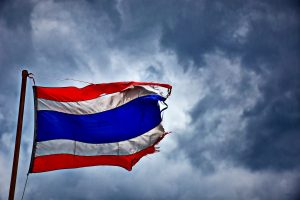Thailand is considering an expansion of prison space as its existing facilities have become swelled with political prisoners arrested in connection with the country’s ongoing pro-democracy protest movement.
Justice Minister Somsak Thepsuthin told reporters yesterday that Bangkok Remand Prison and Klong Prem Central Prison, where most recently detained political prisoners are held, have become congested with visiting supporters and family members.
“Therefore, we are discussing finding a larger area that can accommodate more people for everyone’s convenience,” he told reporters. “Everyone should be treated equally.”
Convenience is one way of putting it. Since the middle of last year, Thailand has seen a simmering protest movement that at its peak saw tens of thousands flock into the center of Bangkok and other Thai cities. The protests have called for the resignation of Prime Minister Prayut Chan-o-cha’s government and the drafting of a new, genuinely democratic constitution. Many protest leaders also aired sensitive calls for reforms to curb the power of the monarchy and the power of King Vajiralongkorn.
According to the legal aid group Thai Lawyers for Human Rights, at least 382 people, including 13 minors, are currently facing charges related to their participation in peaceful political demonstrations or the airing of criticisms of the Thai ruling establishment. This has included at least 58 people who have been charged under the country’s harsh lese majeste law, which outlaws criticisms of the king and the royal family.
Earlier this week, three leading activists were denied bail and remanded in custody on lese majeste charges, a transparent attempt to prevent them from taking part in further demonstrations. In addition to the lese majeste charges, which refer to criticisms of the monarchy that the three activists made at a rally in September, the trio was also charged with sedition alongside 15 other pro-democracy protesters, a court spokesperson said. This came after a further four protest leaders were denied bail on multiple charges of royal defamation last month.
The authorities have also deployed the Computer Crime Act to reel in those who have posted critical comments online, including mockery and criticism of the monarchy and King Vajiralongkorn. This week, the Bangkok Criminal Court also sentenced a 22-year-old man to four-and-a-half years in prison for allegedly writing nine posts criticizing the monarch.
According to the Department of Corrections, Bangkok Remand Prison holds 3,195 prisoners, while Klong Prem Central Prison accommodates 7,009. Somsak did not say how much capacity would be added, but in this context, news that Thailand is seeking to expand its prison capacity only be bad news: a further sign that Prayut’s government, and the military and royalist establishment that stand behind him, have no intention of compromising on any of the movement’s demands, let alone its most radical demands pertaining to the monarchy.
Last month, a group of United Nations human rights experts issued a statement in which they said they were “profoundly disturbed” by the surge in lese majeste cases, and said such an antiquated piece of legislation has “no place in a democratic country.”
“Their increasingly harsh application has had the effect of chilling freedom of expression and further restricting civic space and the enjoyment of fundamental freedoms in Thailand,” the experts added.
Like many such statements, the U.N.’s recommendations were sound and moral, but also curiously untethered from the perceptions of the Thai ruling establishment. For these guardians of wealth and power, restricting the civic space and limiting discussion of Thailand’s elite establishment is precisely the point.

































